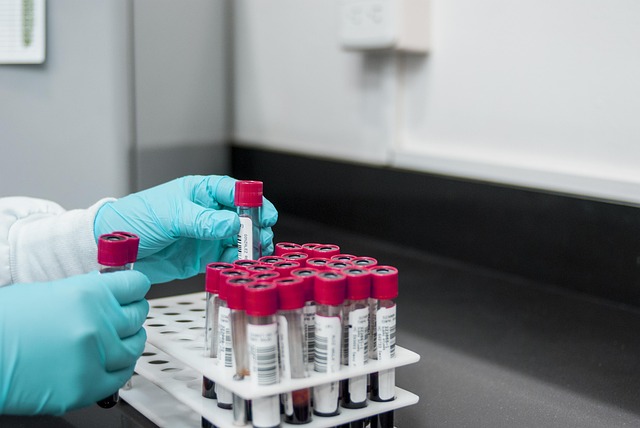Hormone analysis is a powerful tool in the UK for diagnosing and treating reproductive health issues, including PCOS, thyroid disorders, and ovarian insufficiency. Starting with simple Diabetes Blood Tests UK to assess metabolic health, more comprehensive hormone panels help identify essential hormone imbalances. These insights enable tailored treatment plans combining medication, lifestyle changes, or assisted reproduction technologies. Early detection through diabetes blood tests is crucial for improving reproductive outcomes in cases of menstrual irregularities, recurrent miscarriages, or difficulties conceiving. Consulting a healthcare professional and regular follow-up tests are key to effective management and monitoring.
“Unraveling reproductive challenges? Hormone analysis, a powerful tool in the UK, offers insights into your body’s intricate hormonal dance. This comprehensive guide delves into the world of hormone assessments, particularly focusing on diabetes blood tests as a key component.
We explore why these tests are essential for identifying and managing reproductive issues, providing a step-by-step interpretation of results. Whether you’re seeking understanding or navigating treatment, this article offers valuable insights, especially regarding Diabetes Blood Tests in the UK.”
- Understanding Hormone Analysis for Reproductive Health in the UK
- Diabetes Blood Tests: A Crucial Component of Hormonal Assessment
- Interpreting Results and Next Steps After a Hormone Analysis for Reproductive Issues
Understanding Hormone Analysis for Reproductive Health in the UK
Hormone analysis plays a pivotal role in understanding and treating reproductive health issues in the UK. This advanced diagnostic technique involves assessing various hormones circulating in the blood to uncover imbalances that may impact fertility and overall reproductive function. By examining hormone levels, healthcare professionals can identify conditions such as polycystic ovary syndrome (PCOS), thyroid disorders, and ovarian insufficiency, among others. These insights are crucial for developing tailored treatment plans, including medication adjustments, lifestyle interventions, or assisted reproduction technologies.
In the UK, accessing hormone analysis for reproductive health is relatively straightforward. A simple Diabetes Blood Test UK, which measures insulin and glucose levels, can be a starting point for evaluating metabolic health and its relationship with fertility. More comprehensive panels may include tests for estrogen, progesterone, testosterone, and thyroid hormones. These analyses provide valuable data to guide treatment decisions, ensuring patients receive the most effective care possible.
Diabetes Blood Tests: A Crucial Component of Hormonal Assessment
In the UK, diabetes blood tests play a pivotal role in comprehensive hormone analysis, especially when investigating reproductive issues. These tests are essential for assessing insulin levels and glucose metabolism, as imbalances can significantly impact hormonal regulation. Diabetes blood tests help diagnose and monitor conditions like type 1 and type 2 diabetes, which can indirectly affect fertility and reproductive health.
By including these tests as part of a hormone assessment, healthcare professionals gain valuable insights into a patient’s overall metabolic health. This is particularly crucial for individuals experiencing menstrual irregularities, recurrent miscarriages, or difficulties conceiving. Early detection and management of diabetes or pre-diabetic conditions can improve reproductive outcomes and quality of life for those facing hormonal challenges.
Interpreting Results and Next Steps After a Hormone Analysis for Reproductive Issues
After a hormone analysis, interpreting the results is crucial for understanding reproductive health. This process involves comparing your hormone levels against established reference ranges to identify any deviations. Elevated or lowered levels can indicate various conditions such as polycystic ovary syndrome (PCOS), thyroid disorders, or even early signs of menopause. For instance, high follicle-stimulating hormone (FSH) levels could suggest decreased ovarian reserve, which may impact fertility. Similarly, irregular insulin levels might point to undiagnosed diabetes, a condition that can significantly affect reproductive capabilities, as seen in many Diabetes Blood Test UK cases.
Upon receiving these results, the next step is to consult with a healthcare professional who can provide tailored advice and treatment options. They will discuss the implications of your hormone analysis and offer guidance on managing any identified conditions. This might involve lifestyle changes, medication, or specialized reproductive treatments like in-vitro fertilization (IVF). Regular follow-up tests may also be recommended to monitor progress and assess the effectiveness of implemented strategies.
Hormone analysis plays a pivotal role in diagnosing and managing reproductive issues in the UK. When combined with essential diabetes blood tests, it offers a comprehensive insight into an individual’s hormonal health. Understanding the results of these analyses is crucial for determining the next steps towards effective treatment. For those facing reproductive challenges, this scientific approach provides hope and a clearer path to achieving their parenting goals, be it through natural means or assisted technologies. Diabetes blood tests in particular are a vital component, as they can reveal underlying metabolic conditions that may impact fertility.
